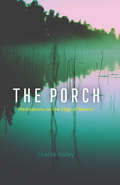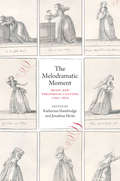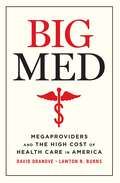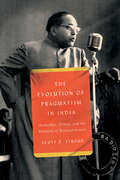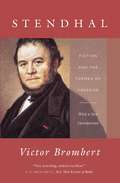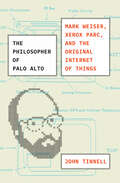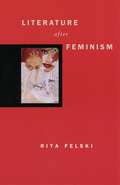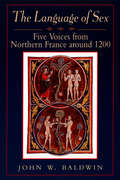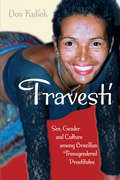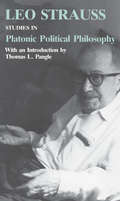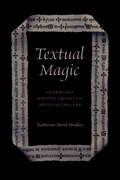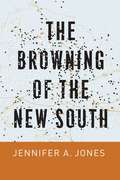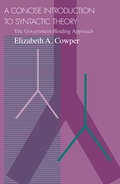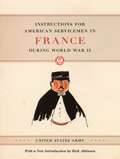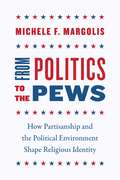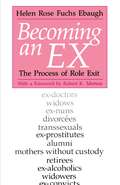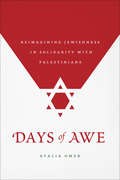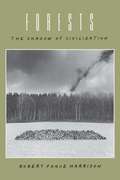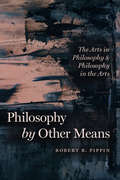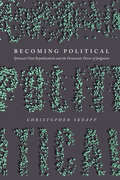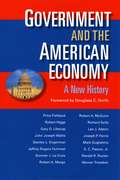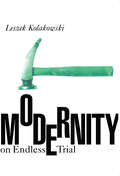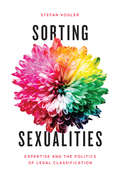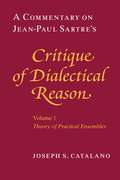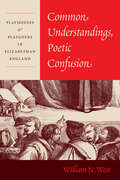- Table View
- List View
The Porch: Meditations on the Edge of Nature
by Charlie HaileyCome with us for a moment out onto the porch. Just like that, we’ve entered another world without leaving home. In this liminal space, an endless array of absorbing philosophical questions arises: What does it mean to be in a place? How does one place teach us about the world and ourselves? What do we—and the things we’ve built—mean in this world? In a time when reflections on the nature of society and individual endurance are so paramount, Charlie Hailey’s latest book is both a mental tonic and a welcome provocation. Solidly grounded in ideas, ecology, and architecture, The Porch takes us on a journey along the edges of nature where the outside comes in, hosts meet guests, and imagination runs wild. Hailey writes from a modest porch on the Homosassa River in Florida. He sleeps there, studies the tides, listens for osprey and manatee, welcomes shipwrecked visitors, watches shadows on its screens, reckons with climate change, and reflects on his own acclimation to his environment. The profound connections he unearths anchor an armchair exploration of past porches and those of the future, moving from ancient Greece to contemporary Sweden, from the White House roof to the Anthropocene home. In his ruminations, he links up with other porch dwellers including environmentalist Rachel Carson, poet Wendell Berry, writers Eudora Welty and Zora Neale Hurston, philosopher John Dewey, architect Louis Kahn, and photographer Paul Strand. As close as architecture can bring us to nature, the porch is where we can learn to contemplate anew our evolving place in a changing world—a space we need now more than ever. Timeless and timely, Hailey’s book is a dreamy yet deeply passionate meditation on the joy and gravity of sitting on the porch.
The Melodramatic Moment: Music and Theatrical Culture, 1790–1820
by Jonathan Hicks Katherine HambridgeWe seem to see melodrama everywhere we look—from the soliloquies of devastation in a Dickens novel to the abject monstrosity of Frankenstein’s creation, and from Louise Brooks’s exaggerated acting in Pandora’s Box to the vicissitudes endlessly reshaping the life of a brooding Don Draper. This anthology proposes to address the sometimes bewilderingly broad understandings of melodrama by insisting on the historical specificity of its genesis on the stage in late-eighteenth-century Europe. Melodrama emerged during this time in the metropolitan centers of London, Paris, Vienna, and Berlin through stage adaptations of classical subjects and gothic novels, and they became famous for their use of passionate expression and spectacular scenery. Yet, as contributors to this volume emphasize, early melodramas also placed sound at center stage, through their distinctive—and often disconcerting—alternations between speech and music. This book draws out the melo of melodrama, showing the crucial dimensions of sound and music for a genre that permeates our dramatic, literary, and cinematic sensibilities today. A richly interdisciplinary anthology, The Melodramatic Moment will open up new dialogues between musicology and literary and theater studies.
Big Med: Megaproviders and the High Cost of Health Care in America
by David Dranove Lawton R. BurnsThere is little debate that health care in the United States is in need of reform. But where should those improvements begin? With insurers? Drug makers? The doctors themselves? In Big Med, David Dranove and Lawton Robert Burns argue that we’re overlooking the most ubiquitous cause of our costly and underperforming system: megaproviders, the expansive health care organizations that have become the face of American medicine. Your local hospital is likely part of one. Your doctors, too. And the megaproviders are bad news for your health and your wallet. Drawing on decades of combined expertise in health care consolidation, Dranove and Burns trace Big Med’s emergence in the 1990s, followed by its swift rise amid false promises of scale economies and organizational collaboration. In the decades since, megaproviders have gobbled up market share and turned independent physicians into salaried employees of big bureaucracies, while delivering on none of their early promises. For patients this means higher costs and lesser care. Meanwhile, physicians report increasingly low morale, making it all but impossible for most systems to implement meaningful reforms. In Big Med, Dranove and Burns combine their respective skills in economics and management to provide a nuanced explanation of how the provision of health care has been corrupted and submerged under consolidation. They offer practical recommendations for improving competition policies that would reform megaproviders to actually achieve the efficiencies and quality improvements they have long promised. This is an essential read for understanding the current state of the health care system in America—and the steps urgently needed to create an environment of better care for all of us.
The Evolution of Pragmatism in India: Ambedkar, Dewey, and the Rhetoric of Reconstruction
by Scott R. StroudThe story of how the Indian reformer Bhimrao Ambedkar reimagined John Dewey’s pragmatism. In The Evolution of Pragmatism in India, Scott R. Stroud delivers a comprehensive exploration of the influence of John Dewey’s pragmatism on Bhimrao Ambedkar, architect of the Republic of India’s constitution. Stroud traces Ambedkar’s development in Dewey’s Columbia University classes in 1913–1916 through his final years in 1950s India when he rewrote the story of Buddhism. Stroud examines pragmatism’s influence not only on the philosophical ideas underpinning Ambedkar’s fight against caste oppression but also how his persuasive techniques drew on pragmatism’s commitment to reconstruction and meliorism. At the same time, Stroud is careful to point out the ways that Ambedkar pushed back against Dewey’s paradigm and developed his own approach to challenges in India. The result is a nuanced study of one of the most important figures in Indian history.
Stendhal: Fiction and the Themes of Freedom
by Victor BrombertVictor Brombert is a lion in the study of French literature, and in this classic of literary criticism, he turns his clear and perspicacious gaze on the works of one of its greatest authors—Stendhal. Best remembered for his novels The Red and the Black and The Charterhouse of Parma, Stendhal is a writer of extraordinary insight into psychology and the many shades of individual and political liberty. Brombert has spent a lifetime reading and teaching Stendhal and here, by focusing on the seemingly contradictory themes of inner freedom and outer constraint within Stendhal’s writings, he offers a revealing analysis of both his work and his life. For Brombert, Stendhal’s work is deeply personal; elsewhere, he has written about the myriad connections between Stendhal’s ironic inquiries into identity and his own boyhood in France on the brink of World War II. Proceeding via careful and nuanced readings of passages from Stendhal’s fiction and autobiography, Brombert pays particular attention to style, tone, and meaning. Paradoxically, Stendhal’s heroes often feel most free when in prison, and in a statement of stunning relevance for our contemporary world, Brombert contends that Stendhal is far clearer than any writer before him on the “crisis and contradictions of modern humanism that . . . render political freedom illusory.” Featuring a new introduction in which Brombert explores his earliest encounters with Stendhal—the beginnings of his “affair” during a year spent as a Fulbright scholar in Rome—Stendhal remains a spirited, elegant, and resonant account.
The Philosopher of Palo Alto: Mark Weiser, Xerox PARC, and the Original Internet of Things
by John TinnellA compelling biography of Mark Weiser, a pioneering innovator whose legacy looms over the tech industry’s quest to connect everything—and who hoped for something better. When developers and critics trace the roots of today’s Internet of Things—our smart gadgets and smart cities—they may single out the same creative source: Mark Weiser (1952–99), the first chief technology officer at Xerox PARC and the so-called “father of ubiquitous computing.” But Weiser, who died young at age 46 in 1999, would be heartbroken if he had lived to see the ways we use technology today. As John Tinnell shows in this thought-provoking narrative, Weiser was an outlier in Silicon Valley. A computer scientist whose first love was philosophy, he relished debates about the machine’s ultimate purpose. Good technology, Weiser argued, should not mine our experiences for saleable data or demand our attention; rather, it should quietly boost our intuition as we move through the world. Informed by deep archival research and interviews with Weiser’s family and colleagues, The Philosopher of Palo Alto chronicles Weiser’s struggle to initiate a new era of computing. Working in the shadows of the dot-com boom, Weiser and his collaborators made Xerox PARC headquarters the site of a grand experiment. Throughout the building, they embedded software into all sorts of objects—coffeepots, pens, energy systems, ID badges—imbuing them with interactive features. Their push to integrate the digital and the physical soon caught on. Microsoft’s Bill Gates flagged Weiser’s Scientific American article “The Computer for the 21st Century” as a must-read. Yet, as more tech leaders warmed to his vision, Weiser grew alarmed about where they wished to take it. In this fascinating story of an innovator and a big idea, Tinnell crafts a poignant and critical history of today’s Internet of Things. At the heart of the narrative is Weiser’s desire for deeper connection, which animated his life and inspired his notion of what technology at its best could be.
Literature after Feminism
by Rita FelskiRecent commentators have portrayed feminist critics as grim-faced ideologues who are destroying the study of literature. Feminists, they claim, reduce art to politics and are hostile to any form of aesthetic pleasure. Literature after Feminism is the first work to comprehensively rebut such caricatures, while also offering a clear-eyed assessment of the relative merits of various feminist approaches to literature. Spelling out her main arguments clearly and succinctly, Rita Felski explains how feminism has changed the ways people read and think about literature. She organizes her book around four key questions: Do women and men read differently? How have feminist critics imagined the female author? What does plot have to do with gender? And what do feminists have to say about the relationship between literary and political value? Interweaving incisive commentary with literary examples, Felski advocates a double critical vision that can do justice to the social and political meanings of literature without dismissing or scanting the aesthetic.
The Language of Sex: Five Voices from Northern France around 1200
by John W. BaldwinThis study brings together widely divergent discourses to fashion a comprehensive picture of sexual language and attitudes at a particular time and place in the medieval world. John Baldwin introduces five representative voices from the turn of the twelfth century in northern France: Pierre the Chanter speaks for the theological doctrine of Augustine; the Prose Salernitan Questions, for the medical theories of Galen; Andre the Chaplain, for the Ovidian literature of the schools; Jean Renart, for the contemporary romances; and Jean Bodel, for the emerging voices of the fabliaux. Baldwin juxtaposes their views on a range of essential subjects, including social position, the sexual body, desire and act, and procreation. The result is a fascinating dialogue of how they agreed or disagreed with, ignored, imitated, or responded to each other at a critical moment in the development of European ideas about sexual desire, fulfillment, morality, and gender. These spokesmen allow us into the discussion of sexuality inside the church and schools of the clergy, in high and popular culture of the leity. This heterogeneous discussion also offers a startling glimpse into the construction of gender specific to this moment, when men and women enjoyed equal status in sexual matters, if nowhere else. Taken together, these voices extend their reach, encompass their subject, and point to a center where social reality lies. By articulating reality at its varied depths, this study takes its place alongside groundbreaking works by James Brundage, John Boswell, and Leah Otis in extending our understanding of sexuality and sexual behavior in the Middle Ages. "Superb work. . . . These five kinds of discourse are not often treated together in scholarly writing, let alone compared and contrasted so well."—Edward Collins Vacek, Theological Studies "[Baldwin] has made the five voices speak to us in a language that is at one and the same time familiar and alien in its resonance and accents. This is a truly exceptional book, interdisciplinary in the real sense of the word, which is surely destined to become a landmark in medieval studies."—Keith Busby, Bryn Mawr Reviews "[Baldwin's] attempt to 'listen' to these distant voices and translate their language of sex into our own raises challenging methodological questions that will be of great interest to historians and literary scholars alike."—John P. Dalton, Comitatus
Travestí: Sex, Gender, and Culture among Brazilian Transgendered Prostitutes (Worlds Of Desire: The Chicago Series On Ser.)
by Don KulíckIn this dramatic and compelling narrative, anthropologist Don Kulick follows the lives of a group of transgendered prostitutes (called travestis in Portuguese) in the Brazilian city Salvador. Travestis are males who, often beginning at ages as young as ten, adopt female names, clothing styles, hairstyles, and linguistic pronouns. More dramatically, they ingest massive doses of female hormones and inject up to twenty liters of industrial silicone into their bodies to create breasts, wide hips, and large thighs and buttocks. Despite such irreversible physiological changes, virtually no travesti identifies herself as a woman. Moreover, travestis regard any male who does so as mentally disturbed. Kulick analyzes the various ways travestis modify their bodies, explores the motivations that lead them to choose this particular gendered identity, and examines the complex relationships that they maintain with one another, their boyfriends, and their families. Kulick also looks at how travestis earn their living through prostitution and discusses the reasons prostitution, for most travestis, is a positive and affirmative experience. Arguing that transgenderism never occurs in a "natural" or arbitrary form, Kulick shows how it is created in specific social contexts and assumes specific social forms. Furthermore, Kulick suggests that travestis—far from deviating from normative gendered expectations—may in fact distill and perfect the messages that give meaning to gender throughout Brazilian society and possibly throughout much of Latin America. Through Kulick's engaging voice and sharp analysis, this elegantly rendered account is not only a landmark study in its discipline but also a fascinating read for anyone interested in sexuality and gender.
Studies in Platonic Political Philosophy
by Leo StraussOne of the outstanding thinkers of our time offers in this book his final words to posterity. Studies in Platonic Political Philosophy was well underway at the time of Leo Strauss's death in 1973. Having chosen the title for the book, he selected the most important writings of his later years and arranged them to clarify the issues in political philosophy that occupied his attention throughout his life. As his choice of title indicates, the heart of Strauss's work is Platonism—a Platonism that is altogether unorthodox and highly controversial. These essays consider, among others, Heidegger, Husserl, Nietzsche, Marx, Moses Maimonides, Machiavelli, and of course Plato himself to test the Platonic understanding of the conflict between philosophy and political society. Strauss argues that an awesome spritual impoverishment has engulfed modernity because of our dimming awareness of that conflict. Thomas Pangle's Introduction places the work within the context of the entire Straussian corpus and focuses especially on Strauss's late Socratic writings as a key to his mature thought. For those already familiar with Strauss, Pangle's essay will provoke thought and debate; for beginning readers of Strauss, it provides a fine introduction. A complete bibliography of Strauss's writings if included.
Textual Magic: Charms and Written Amulets in Medieval England
by Katherine Storm HindleyAn expansive consideration of charms as a deeply integrated aspect of the English Middle Ages. Katherine Storm Hindley explores words at their most powerful: words that people expected would physically change the world. Medieval Europeans often resorted to the use of spoken or written charms to ensure health or fend off danger. Hindley draws on an unprecedented archive of more than a thousand such charms from medieval England—more than twice the number gathered, transcribed, and edited in previous studies and including many texts still unknown to specialists on this topic. Focusing on charms from 1100 to 1350 CE as well as previously unstudied texts in Latin, French, and English, Hindley addresses important questions of how people thought about language, belief, and power. She describes seven hundred years of dynamic, shifting cultural landscapes, where multiple languages, alphabets, and modes of transmission gained and lost their protective and healing power. Where previous scholarship has bemoaned a lack of continuity in the English charms, Hindley finds surprising links between languages and eras, all without losing sight of the extraordinary variety of the medieval charm tradition: a continuous, deeply rooted part of the English Middle Ages.
The Browning of the New South
by Jennifer A. JonesStudies of immigration to the United States have traditionally focused on a few key states and urban centers, but recent shifts in nonwhite settlement mean that these studies no longer paint the whole picture. Many Latino newcomers are flocking to places like the Southeast, where typically few such immigrants have settled, resulting in rapidly redrawn communities. In this historic moment, Jennifer Jones brings forth an ethnographic look at changing racial identities in one Southern city: Winston-Salem, North Carolina. This city turns out to be a natural experiment in race relations, having quickly shifted in the past few decades from a neatly black and white community to a triracial one. Jones tells the story of contemporary Winston-Salem through the eyes of its new Latino residents, revealing untold narratives of inclusion, exclusion, and interracial alliances. The Browning of the New South reveals how one community’s racial realignments mirror and anticipate the future of national politics.
A Concise Introduction to Syntactic Theory: The Government-Binding Approach
by Elizabeth A. CowperThis textbook is intended to give students a quick start in using theory to address syntactic questions. At each stage, Cowper is careful to introduce a theoretical apparatus that is no more complex than is required to deal with the phenomenon under consideration. Comprehensive and up-to-date, this accessible volume will also provide an excellent refresher for linguists returning to the study of Government-Binding theory. "Cowper exhibits the analytical devices of current principles-and-parameters approaches, takes readers carefully through the central elements of grammatical theory (including very recent work), and ushers them selectively into the technical literature. . . . A serious introduction for those who want to know the nuts and bolts of syntactic theory and to see why linguists are so excited these days."—David Lightfoot, University of Maryland "An excellent short introduction to the Government and Binding model of syntactic theory. . . . Cowper's work succeeds in teaching syntactic argumentation and in showing the conceptual reasons behind specific proposals in modern syntactic theory."—Jaklin Kornfilt, Syracuse University
Instructions for American Servicemen in France during World War II
by United States Army“You are about to play a personal part in pushing the Germans out of France. Whatever part you take—rifleman, hospital orderly, mechanic, pilot, clerk, gunner, truck driver—you will be an essential factor in a great effort.” As American soldiers fanned out from their beachhead in Normandy in June of 1944 and began the liberation of France, every soldier carried that reminder in his kit. A compact trove of knowledge and reassurance, Instructions for American Servicemen in France during World War II was issued to soldiers just before they embarked for France to help them understand both why they were going and what they’d find when they got there. After lying unseen in Army archives for decades, this remarkable guide is now available in a new facsimile edition that reproduces the full text and illustrations of the original along with a new introduction by Rick Atkinson setting the book in context. Written in a straightforward, personal tone, the pamphlet is equal parts guidebook, cultural snapshot, and propaganda piece. A central aim is to dispel any prejudices American soldiers may have about the French—especially relating to their quick capitulation in 1940. Warning soldiers that the defeat “is a raw spot which the Nazis have been riding” since the occupation began, Instructions is careful to highlight France’s long historical role as a major U.S. ally. Following that is a brief, fascinating sketch of the French character (“The French are mentally quick;” “Rich or poor, they are economical”) and stark reminders of the deprivation the French have endured under occupation. Yet an air of reassuring confidence pervades the final section of the pamphlet, which reads like a straightforward tourists’ guide to Paris and the provinces—like a promise of better days to come once the soldiers complete their mission. Written by anonymous War Department staffers to meet the urgent needs of the moment, with no thought of its historical value, Instructionsfor American Servicemen in France during World War II nevertheless brings to vivid life the closing years of World War II—when optimism was growing, but a long, demanding road still lay ahead.
From Politics to the Pews: How Partisanship and the Political Environment Shape Religious Identity (Chicago Studies In American Politics Ser.)
by Michele F. MargolisOne of the most substantial divides in American politics is the “God gap.” Religious voters tend to identify with and support the Republican Party, while secular voters generally support the Democratic Party. Conventional wisdom suggests that religious differences between Republicans and Democrats have produced this gap, with voters sorting themselves into the party that best represents their religious views. Michele F. Margolis offers a bold challenge to the conventional wisdom, arguing that the relationship between religion and politics is far from a one-way street that starts in the church and ends at the ballot box. Margolis contends that political identity has a profound effect on social identity, including religion. Whether a person chooses to identify as religious and the extent of their involvement in a religious community are, in part, a response to political surroundings. In today’s climate of political polarization, partisan actors also help reinforce the relationship between religion and politics, as Democratic and Republican elites stake out divergent positions on moral issues and use religious faith to varying degrees when reaching out to voters.
Becoming an Ex: The Process of Role Exit
by Helen Rose Fuchs EbaughThe experience of becoming an ex is common to most people in modern society. Unlike individuals in earlier cultures who usually spent their entire lives in one marriage, one career, one religion, one geographic locality, people living in today's world tend to move in and out of many roles in the course of a lifetime. During the past decade there has been persistent interest in these "passages" or "turning points," but very little research has dealt with what it means to leave behind a major role or incorporate it into a new identity. Helen Rose Fuchs Ebaugh's pathbreaking inquiry into the phenomenon of becoming an ex reveals the profundity of this basic aspect of establishing an identity in contemporary life. Ebaugh is herself an ex, having left the life of a Catholic nun to become a wife, mother, and professor of sociology. Drawing on interviews with 185 people, Ebaugh explores a wide range of role changes, including ex-convicts, ex-alcoholics, divorced people, mothers without custody of their children, ex-doctors, ex-cops, retirees, ex-nuns, and—perhaps most dramatically—transsexuals. As this diverse sample reveals, Ebaugh focuses on voluntary exits from significant roles. What emerges are common stages of the role exit process—from disillusionment with a particular identity, to searching for alternative roles, to turning points that trigger a final decision to exit, and finally to the creation of an identify as an ex.Becoming an Ex is a challenging and influential study that will be of great interest to sociologists, mental health counselors, members of self-help groups such as Alcoholics Anonymous and Parents Without Partners, those in corporate settings where turnover has widespread implications for the organization, and for anyone struggling through a role exit who is trying to establish a new sense of self.
Days of Awe: Reimagining Jewishness in Solidarity with Palestinians
by Atalia OmerFor many Jewish people in the mid-twentieth century, Zionism was an unquestionable tenet of what it meant to be Jewish. Seventy years later, a growing number of American Jews are instead expressing solidarity with Palestinians, questioning old allegiances to Israel. How did that transformation come about? What does it mean for the future of Judaism? In Days of Awe, Atalia Omer examines this shift through interviews with a new generation of Jewish activists, rigorous data analysis, and fieldwork within a progressive synagogue community. She highlights people politically inspired by social justice campaigns including the Black Lives Matter movement and protests against anti-immigration policies. These activists, she shows, discover that their ethical outrage at US policies extends to Israel’s treatment of Palestinians. For these American Jews, the Jewish history of dispossession and diaspora compels a search for solidarity with liberation movements. This shift produces innovations within Jewish tradition, including multi-racial and intersectional conceptions of Jewishness and movements to reclaim prophetic Judaism. Charting the rise of such religious innovation, Omer points toward the possible futures of post-Zionist Judaism.
Forests: The Shadow of Civilization
by Robert Pogue HarrisonIn this wide-ranging exploration of the role of forests in Western thought, Robert Pogue Harrison enriches our understanding not only of the forest's place in the cultural imagination of the West, but also of the ecological dilemmas that now confront us so urgently. Consistently insightful and beautifully written, this work is especially compelling at a time when the forest, as a source of wonder, respect, and meaning, disappears daily from the earth. "Forests is one of the most remarkable essays on the human place in nature I have ever read, and belongs on the small shelf that includes Raymond Williams' masterpiece, The Country and the City. Elegantly conceived, beautifully written, and powerfully argued, [Forests] is a model of scholarship at its passionate best. No one who cares about cultural history, about the human place in nature, or about the future of our earthly home, should miss it.—William Cronon, Yale Review "Forests is, among other things, a work of scholarship, and one of immense value . . . one that we have needed. It can be read and reread, added to and commented on for some time to come."—John Haines, The New York Times Book Review
Philosophy by Other Means: The Arts in Philosophy & Philosophy in the Arts
by Robert B. PippinThroughout his career, Robert B. Pippin has examined the relationship between philosophy and the arts. With his writings on film, literature, and visual modernism, he has shown that there are aesthetic objects that cannot be properly understood unless we acknowledge and reflect on the philosophical concerns that are integral to their meaning. His latest book, Philosophy by Other Means, extends this trajectory, offering a collection of essays that present profound considerations of philosophical issues in aesthetics alongside close readings of novels by Henry James, Marcel Proust, and J. M. Coetzee. The arts hold a range of values and ambitions, offering beauty, playfulness, and craftsmanship while deepening our mythologies and enriching the human experience. Some works take on philosophical ambitions, contributing to philosophy in ways that transcend the discipline’s traditional analytic and discursive forms. Pippin’s claim is twofold: criticism properly understood often requires a form of philosophical reflection, and philosophy is impoverished if it is not informed by critical attention to aesthetic objects. In the first part of the book, he examines how philosophers like Kant, Hegel, and Adorno have considered the relationship between art and philosophy. The second part of the book offers an exploration of how individual artworks might be considered forms of philosophical reflection. Pippin demonstrates the importance of practicing philosophical criticism and shows how the arts can provide key insights that are out of reach for philosophy, at least as traditionally understood.
Becoming Political: Spinoza’s Vital Republicanism and the Democratic Power of Judgment
by Christopher SkeaffIn this pathbreaking work, Christopher Skeaff argues that a profoundly democratic conception of judgment is at the heart of Spinoza’s thought. Bridging Continental and Anglo-American scholarship, critical theory, and Spinoza studies, Becoming Political offers a historically sensitive, meticulous, and creative interpretation of Spinoza’s texts that reveals judgment as the communal element by which people generate power to resist domination and reconfigure the terms of their political association. If, for Spinoza, judging is the activity which makes a people powerful, it is because it enables them to contest the project of ruling and demonstrate the political possibility of being equally free to articulate the terms of their association. This proposition differs from a predominant contemporary line of argument that treats the people’s judgment as a vehicle of sovereignty—a means of defining and refining the common will. By recuperating in Spinoza’s thought a “vital republicanism,” Skeaff illuminates a line of political thinking that decouples democracy from the majoritarian aspiration to rule and aligns it instead with the project of becoming free and equal judges of common affairs. As such, this decoupling raises questions that ordinarily go unasked: what calls for political judgment, and who is to judge? In Spinoza’s vital republicanism, the political potential of life and law finds an affirmative relationship that signals the way toward a new constitutionalism and jurisprudence of the common.
Government and the American Economy: A New History
by Price V. FishbackThe American economy has provided a level of well-being that has consistently ranked at or near the top of the international ladder. A key source of this success has been widespread participation in political and economic processes. In The Government and the American Economy, leading economic historians chronicle the significance of America’s open-access society and the roles played by government in its unrivaled success story. America’s democratic experiment, the authors show, allowed individuals and interest groups to shape the structure and policies of government, which, in turn, have fostered economic success and innovation by emphasizing private property rights, the rule of law, and protections of individual freedom. In response to new demands for infrastructure, America’s federal structure hastened development by promoting the primacy of states, cities, and national governments. More recently, the economic reach of American government expanded dramatically as the populace accepted stronger limits on its economic freedoms in exchange for the increased security provided by regulation, an expanded welfare state, and a stronger national defense.
Modernity on Endless Trial
by Leszek Kolakowski,Leszek Kolakowski delves into some of the most intellectually vigorous questions of our time in this remarkable collection of essays garnished with his characteristic wit. Ten of the essays have never appeared before in English. "Exemplary. . . . It should be celebrated." —Arthur C. Danto, New York Times Book Review "This book . . . express[es] Kolakowski's thought on God, man, reason, history, moral truth and original sin, prompted by observation of the dramatic struggle among Christianity, the Enlightenment and modern totalitarianism. It is a wonderful collection of topics." —Thomas Nagel, Times Literary Supplement "No better antidote to bumper-sticker thinking exists than this collection of 24 'appeals for moderation in consistency,' and never has such an antidote been needed more than it is now." —Joseph Coates, Chicago Tribune "Whether learned or humorous, these essays offer gems in prose of diamond hardness, precision, and brilliance." —Thomas D'Evelyn, The Christian Science Monitor A "Notable Books of the Year 1991" selection, New York Times Book Review—a "Noted with Pleasure" selection, New York Times Book Review—a "Summer Reading 1991" selection, New York Times Book Review—a "Books of the Year" selection, The Times.
Sorting Sexualities: Expertise and the Politics of Legal Classification
by Stefan VoglerIn Sorting Sexualities, Stefan Vogler deftly unpacks the politics of the techno-legal classification of sexuality in the United States. His study focuses specifically on state classification practices around LGBTQ people seeking asylum in the United States and sexual offenders being evaluated for carceral placement—two situations where state actors must determine individuals’ sexualities. Though these legal settings are diametrically opposed—one a punitive assessment, the other a protective one—they present the same question: how do we know someone’s sexuality? In this rich ethnographic study, Vogler reveals how different legal arenas take dramatically different approaches to classifying sexuality and use those classifications to legitimate different forms of social control. By delving into the histories behind these diverging classification practices and analyzing their contemporary reverberations, Vogler shows how the science of sexuality is far more central to state power than we realize.
A Commentary on Jean-Paul Sartre's Critique of Dialectical Reason: Theory Of Practical Ensembles (Theory of Practical Ensembles)
by Joseph S. CatalanoSartre’s Critique of Dialectical Reason ranks with Being and Nothingness as a work of major philosophical significance, but it has been largely neglected. The first volume, published in 1960, was dismissed as a Marxist work at a time when structuralism was coming into vogue; the incomplete second volume has only recently been published in France. In this commentary on the first volume, Joseph S. Catalano restores the Critique to its deserved place among Sartre’s works and within philosophical discourse as a whole. Sartre attempts one of the most needed tasks of our times, Catalano asserts—the delivery of history into the hands of the average person. Sartre’s concern in the Critique is with the historical significance of everyday life. Can we, he asks, as individuals or even collectively, direct the course of our history? A historical context for our lives is given to us at birth, but we sustain that context with even our most mundane actions—buying a newspaper, waiting in line, eating a meal. In looking at history, Sartre argues, reason can never separate the historical situation of the investigator from the investigation. Thus reason falls into a dialectic, always depending upon the past for guidance but always being reshaped by the present. Clearly showing the influence of Marx on Sartre’s thought, the Critique adds the historical dimension lacking in Being and Nothingness. In placing the Critique within the corpus of Sartre’s philosophical writings, Catalano argues that it represents a development rather than a break from Sartre’s existentialist phase. Catalano has organized his commentary to follow the Critique and has supplied clear examples and concrete expositions of the most difficult ideas. He explicates the dialogue between Marx and Sartre that is internal to the text, and he also discusses Sartre’s Search for Method, which is published separately from the Critique in English editions.
Common Understandings, Poetic Confusion: Playhouses & Playgoers in Elizabethan England
by William N. WestA new account of playgoing in Elizabethan England, in which audiences participated as much as performers. What if going to a play in Elizabethan England was more like attending a football match than a Broadway show—or playing in one? In Common Understandings, Poetic Confusion, William N. West proposes a new account of the kind of participatory entertainment expected by the actors and the audience during the careers of Shakespeare and his contemporaries. West finds surprising descriptions of these theatrical experiences in the figurative language of early modern players and playgoers—including understanding, confusion, occupation, eating, and fighting. Such words and ways of speaking are still in use today, but their earlier meanings, like that of theater itself, are subtly, importantly different from our own. Playing was not confined to the actors on the stage but filled the playhouse, embracing audiences and performers in collaborative experiences that did not belong to any one alone but to the assembled, various crowd. What emerged in playing was a kind of thinking and feeling distributed across persons and times that were otherwise distinct. Thrown apples, smashed bottles of beer, and lumbering bears—these and more gave verbal shape to the physical interactions between players and playgoers, creating circuits of exchange, production, and consumption.
